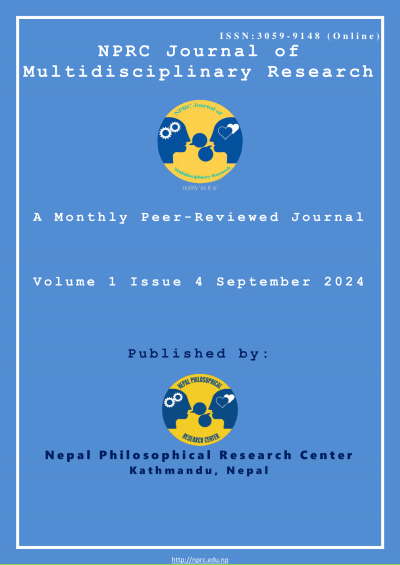Global Climate Change: Challenges, Opportunities, and Multilateral Strategies for Sustainable Development
DOI:
https://doi.org/10.3126/nprcjmr.v1i4.70947Keywords:
Climate change, global partnerships, sustainable development, international cooperation, carbon emissionsAbstract
Background: Climate change is one of the most pressing global challenges, demanding collaborative action from both developed and developing countries. Despite numerous international agreements like the Kyoto Protocol and the Paris Agreement, political will and leadership commitment have been inconsistent, hindering effective global climate action. Private actors and global partnerships have emerged as critical players in addressing climate risks, but geopolitical and economic tensions continue to impede progress. Objectives: This research explores the key challenges and opportunities in combating climate change, emphasizing the role of international cooperation, the involvement of private and public sectors, and the need for innovative solutions. It also seeks to examine the responsibilities of developed and developing countries in contributing to global climate goals. Methods: A qualitative analysis was conducted by reviewing relevant literature, international agreements, and case studies. Data from climate summits, reports, and expert opinions were integrated to understand the political, economic, and environmental dimensions of climate change. Findings: The study identifies several challenges, including a lack of political will among major powers, economic competition, and inconsistent global leadership. It also highlights opportunities, such as the potential for technological innovation, investment in renewable energy, and the strategic role of private actors in promoting sustainable development. The findings underscore the importance of global partnerships and multilateral platforms like the United Nations in fostering cooperation among nations. Conclusion: Addressing climate change requires a holistic approach involving state and non-state actors, strong political leadership, and global partnerships. The transition to a low-carbon economy will require significant economic restructuring, but it presents opportunities for innovation and sustainable development. The study emphasizes the need for developed countries to fulfill their financial commitments to support adaptation in developing nations. Novelty: This research contributes to the existing literature by providing a comprehensive analysis of both the challenges and opportunities in combating climate change. It highlights the critical role of private actors and international cooperation, offering a framework for future global actions.
Downloads
Downloads
Published
How to Cite
Issue
Section
License
Copyright (c) 2024 The Author(s)

This work is licensed under a Creative Commons Attribution-NonCommercial 4.0 International License.
This license enables reusers to distribute, remix, adapt, and build upon the material in any medium or format for noncommercial purposes only, and only so long as attribution is given to the creator.





